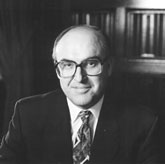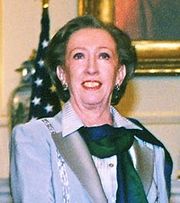_leadership_election,_1992.gif)
Labour Party (UK) leadership election, 1992
Encyclopedia
The Labour Party leadership election of 1992 followed the Labour Party
's failure to win the 1992 general election
and the subsequent resignation of party leader Neil Kinnock
.
There were only two candidates in the election, with John Smith
always the clear favourite to win. The ballot took place on 18 July 1992. Affiliated organisations had 40% of the vote, while Constituency Labour Parties and the Parliamentary Labour Party had 30% each in the electoral college
. Gordon Brown
and Robin Cook
were both seen as potential candidates, but didn't stand.

Shortly after Black Wednesday
in September 1992, the Labour's lead in the polls began to rise and over the course of Smith's two year leadership, he was widely predicted to become the next prime minister, come the next General Election.
With a clear majority, John Smith was elected leader of the Labour Party. He would only serve two years before his death, which precipitated another leadership election
.


Labour Party (UK)
The Labour Party is a centre-left democratic socialist party in the United Kingdom. It surpassed the Liberal Party in general elections during the early 1920s, forming minority governments under Ramsay MacDonald in 1924 and 1929-1931. The party was in a wartime coalition from 1940 to 1945, after...
's failure to win the 1992 general election
United Kingdom general election, 1992
The United Kingdom general election of 1992 was held on 9 April 1992, and was the fourth consecutive victory for the Conservative Party. This election result was one of the biggest surprises in 20th Century politics, as polling leading up to the day of the election showed Labour under leader Neil...
and the subsequent resignation of party leader Neil Kinnock
Neil Kinnock
Neil Gordon Kinnock, Baron Kinnock is a Welsh politician belonging to the Labour Party. He served as a Member of Parliament from 1970 until 1995 and as Labour Leader and Leader of Her Majesty's Loyal Opposition from 1983 until 1992 - his leadership of the party during nearly nine years making him...
.
There were only two candidates in the election, with John Smith
John Smith (UK politician)
John Smith was a British Labour Party politician who served as Leader of the Labour Party from July 1992 until his sudden death from a heart attack in May 1994...
always the clear favourite to win. The ballot took place on 18 July 1992. Affiliated organisations had 40% of the vote, while Constituency Labour Parties and the Parliamentary Labour Party had 30% each in the electoral college
Electoral college
An electoral college is a set of electors who are selected to elect a candidate to a particular office. Often these represent different organizations or entities, with each organization or entity represented by a particular number of electors or with votes weighted in a particular way...
. Gordon Brown
Gordon Brown
James Gordon Brown is a British Labour Party politician who was the Prime Minister of the United Kingdom and Leader of the Labour Party from 2007 until 2010. He previously served as Chancellor of the Exchequer in the Labour Government from 1997 to 2007...
and Robin Cook
Robin Cook
Robert Finlayson Cook was a British Labour Party politician, who was the Member of Parliament for Livingston from 1983 until his death, and notably served in the Cabinet as Foreign Secretary from 1997 to 2001....
were both seen as potential candidates, but didn't stand.

| Candidate | Affiliated Affiliated trade union In British politics, the term affiliated trade union refers to a trade union that has an affiliation to the British Labour Party.The Party was created by the trade unions and socialist societies in 1900 as the Labour Representation Committee... | Constituency Constituency Labour Party A Constituency Labour Party is an organisation of members of the British Labour Party who live in a particular UK parliamentary constituency in England, Scotland and Wales. The Labour Party in Northern Ireland has, since February 2009, been organised as a province-wide Constituency Labour Party... | Parliamentary Parliamentary Labour Party In UK politics, the Parliamentary Labour Party is the parliamentary party of the Labour Party in Parliament: Labour MPs as a collective body.... | Total | |
|---|---|---|---|---|---|
| John Smith John Smith (UK politician) John Smith was a British Labour Party politician who served as Leader of the Labour Party from July 1992 until his sudden death from a heart attack in May 1994... |
38.5 | 29.3 | 23.2 | 91.0 | |
| Bryan Gould Bryan Gould Bryan Charles Gould, CNZM is a former United Kingdom politician. He served as a Member of Parliament from 1974–79, and again from 1983–94... |
1.5 | 0.7 | 6.8 | 9.0 |
Shortly after Black Wednesday
Black Wednesday
In politics and economics, Black Wednesday refers to the events of 16 September 1992 when the British Conservative government was forced to withdraw the pound sterling from the European Exchange Rate Mechanism after they were unable to keep it above its agreed lower limit...
in September 1992, the Labour's lead in the polls began to rise and over the course of Smith's two year leadership, he was widely predicted to become the next prime minister, come the next General Election.
With a clear majority, John Smith was elected leader of the Labour Party. He would only serve two years before his death, which precipitated another leadership election
Labour Party (UK) leadership election, 1994
A leadership election was held on 21 July 1994 for the Labour Party in the United Kingdom, after the sudden death of incumbent leader John Smith. The 1994 election would ultimately decide not only Labour's new leader, but also the next Prime Minister...
.


Deputy leadership election
| Ballot result | |||
|---|---|---|---|
| Candidate | Votes | ||
| Margaret Beckett Margaret Beckett Margaret Mary Beckett is a British Labour Party politician who has been the Member of Parliament for Derby South since 1983, rising to become the Deputy Leader of the Labour Party under John Smith, from 18 July 1992 to 12 May 1994, and briefly serving as Leader of the Party following Smith's death... |
57.3% | ||
| John Prescott John Prescott John Leslie Prescott, Baron Prescott is a British politician who was Deputy Prime Minister of the United Kingdom from 1997 to 2007. Born in Prestatyn, Wales, he represented Hull East as the Labour Member of Parliament from 1970 to 2010... |
28.1% | ||
| Bryan Gould Bryan Gould Bryan Charles Gould, CNZM is a former United Kingdom politician. He served as a Member of Parliament from 1974–79, and again from 1983–94... |
14.6% | ||
| Margaret Beckett elected | |||

